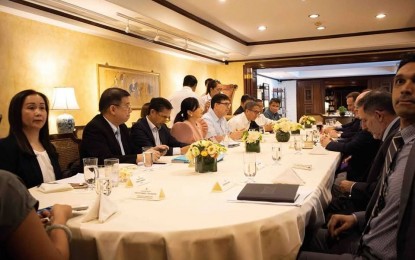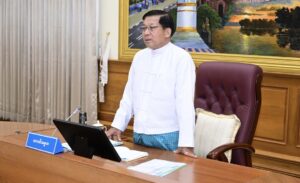Philippines Signals Strategic Economic Alignment with U.S. During Senate Delegation Visit

Manila, The Gulf Observer: The Philippine government has expressed a strong intent to pursue a deeper strategic economic partnership with the United States amid rising global complexities, signaling a new phase in bilateral cooperation.
This commitment was emphasized during the visit of a bipartisan U.S. Congressional delegation to Manila on Tuesday, led by Senators Pete Ricketts (R-Nebraska), Chris Coons (D-Delaware), and Ted Budd (R-North Carolina). The delegation’s visit marked the first high-level engagement under the new U.S. Trump administration.
Philippine Trade Secretary Cristina Roque described the meeting as more than a diplomatic formality, stating that it reflected Manila’s readiness to align with Washington as a “strategic economic partner” in pursuit of shared goals in economic security, innovation, and inclusive prosperity.
“More than a diplomatic courtesy, the engagement served as a strong signal of intent – that the Philippines is ready to pursue strategic alignment with the United States,” the Department of Trade and Industry (DTI) said in a statement released on April 16.
Joining the high-level discussions were key cabinet members: Transportation Secretary Vince Dizon, Energy Secretary Raphael Lotilla, ICT Secretary Henry Rhoel Aguda, and Finance Secretary Ralph Recto. The talks focused on expanding cooperation in clean energy, digital infrastructure, transport modernization, and fiscal sustainability.
The United States remains a major economic partner of the Philippines. In 2024, U.S. imports from the Philippines amounted to USD14.2 billion, up 6.9 percent from the previous year, while U.S. exports to the Philippines totaled USD9.3 billion. The U.S. accounted for 17 percent of Philippine exports last year.
Top Philippine exports to the U.S. include semiconductors, computer peripherals, automobile parts, coconut oil, and business process outsourcing (BPO) services. In contrast, the U.S. exports to the Philippines largely consist of agricultural goods, machinery, cereals, and materials used in semiconductor and electronics manufacturing.
The meeting also highlighted the implementation of the landmark 123 Agreement – the U.S.-Philippines Agreement for Cooperation in Peaceful Uses of Nuclear Energy – which entered into force in 2023. This agreement facilitates the exchange of nuclear materials, technology, and components between the two nations, bolstering Manila’s efforts toward energy diversification and resilience.
As the Philippines continues to navigate a complex geopolitical and economic landscape, the renewed commitment to U.S. partnership is expected to bring long-term benefits through investment, innovation, and regional stability.


